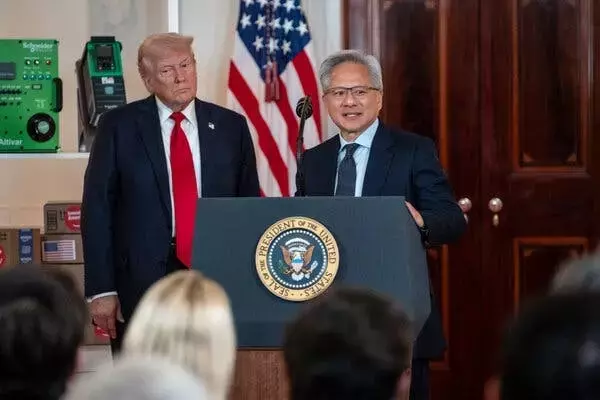
A contentious agreement has recently emerged involving the U.S. government and prominent semiconductor manufacturers, Nvidia and AMD. This deal mandates that both companies remit 15 percent of their earnings from artificial intelligence chip sales to China back to the U.S. Treasury, in exchange for export licenses. This development has ignited a fervent discussion, with some observers interpreting it as an innovative approach to industrial policy, while others view it critically, likening it to a form of governmental coercion. The financial implications are substantial, with projections indicating billions of dollars in revenue for the U.S. It also intensifies scrutiny on the overarching objectives of the current administration's trade policies and their potential impact on American leadership in the critical field of artificial intelligence and national security.
The agreement underscores a pivotal moment in U.S. trade relations, particularly with China. Jensen Huang, the CEO of Nvidia, engaged in discussions with President Trump, culminating in Nvidia's consent to contribute a fraction of its H20 processor sales. Similarly, AMD entered into a comparable arrangement concerning its MI308 chips. This unprecedented financial stipulation could funnel over two billion dollars into government coffers, based on sales forecasts. Huang had previously advocated for expanded business dealings with China, highlighting the risk of losing market share to Chinese competitors like Huawei if restrictions remained. This pragmatic stance contrasts with the administration's stated goals of asserting American supremacy in international commerce and AI, leading to questions about the true intent behind these unusual trade concessions. Critics, including former National Security Council officials, express alarm that providing even limited access to advanced chip technology could inadvertently empower rivals and set a dangerous precedent for future trade negotiations.
The unfolding scenario also brings into sharper focus the broader implications for the U.S. economy, particularly concerning inflation and interest rates. The administration's tariff strategy, while purportedly aimed at rebalancing global trade, has also been presented as a revenue-generating mechanism. However, economists have consistently warned about the inflationary pressures stemming from these tariffs, a concern that gains traction with forthcoming economic data releases. The Consumer Price Index report, in particular, is anticipated to shed light on how tariffs are influencing consumer prices and overall economic stability. A significant upward trend in inflation could intensify fears of stagflation—a combination of stagnant economic growth and rising prices—and complicate the Federal Reserve's decisions regarding interest rate adjustments. The recent jobs report, indicating downward revisions in employment figures, further suggests a potential slowdown in economic activity, which could be exacerbated by protectionist trade measures.
Adding another layer of complexity to the narrative is the controversy surrounding potential presidential clemency for Changpeng Zhao, the founder of the cryptocurrency exchange Binance, who previously admitted to money-laundering offenses. The crypto industry has experienced considerable growth during the current administration, benefiting various individuals, including the President's family. Zhao's pursuit of a pardon, facilitated by a robust lobbying effort that allegedly includes directing business to a Trump-affiliated crypto entity, has sparked ethical concerns. Critics fear that a pardon could not only provide Zhao with regulatory advantages in the U.S. but also signal a troubling intersection of political influence and financial gain. This situation further complicates the landscape of American economic policy and international business relations.
Ultimately, the actions taken by the administration regarding chip sales, trade tariffs, and even clemency considerations, weave a complex tapestry of economic and political maneuvering. These decisions not only redefine the boundaries of international trade and industrial policy but also have far-reaching consequences for market dynamics, economic stability, and the perception of American leadership on the global stage. The immediate and long-term impacts of these strategies continue to be a subject of intense analysis and debate among policymakers, industry leaders, and the public.
